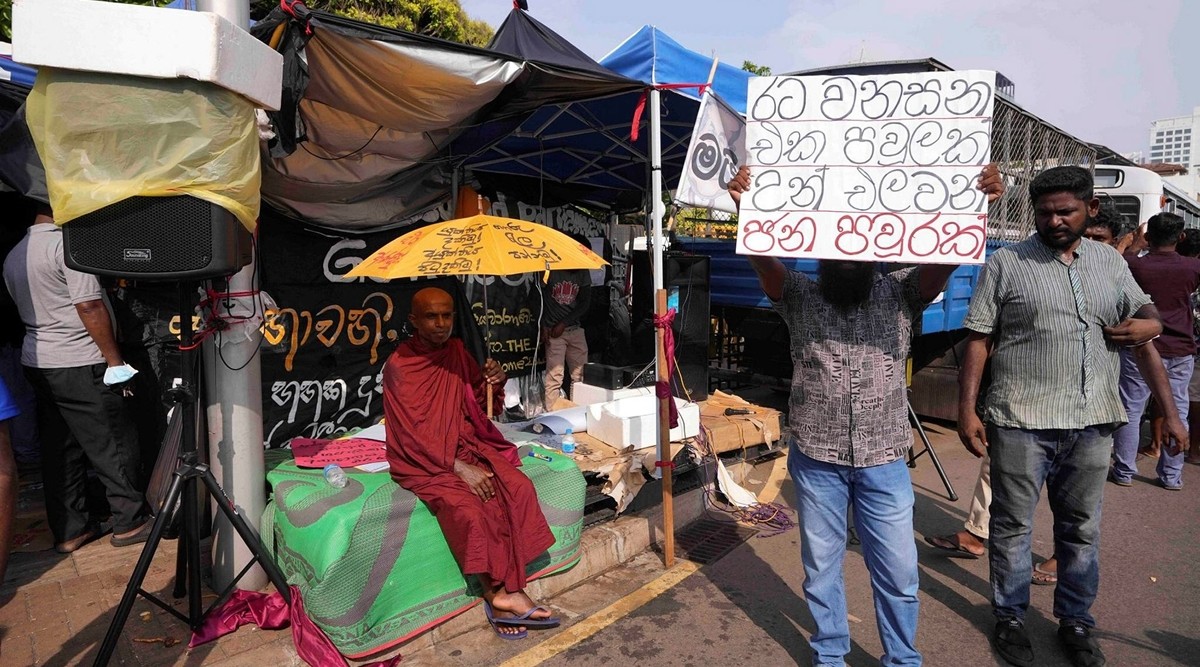Sri Lankan Finance Minister Sabry tells Parliament
by Press Trust of India in Indian Express, May 4, 2022
Detailing the perilous state of the economy, Ali Sabry said Sri Lanka’s usable foreign reserves which were at around USD 7 billion in 2019, had dropped to less than USD 50 million now.
“We have bitten off more than what we can chew,” debt-ridden Sri Lanka’s Finance Minister Ali Sabry acknowledged before Parliament on Wednesday while reminding warring political parties that they have a national responsibility to contribute to revive the island nation’s collapsed economy.

A Sri Lankan Buddhist monk sits as a man shows a placard denouncing the Rajapaksa family and alleging their involvement in corruption, in Colombo, Sri Lanka, Wednesday. (AP)
Detailing the perilous state of the economy, Sabry, who has just returned from Washington after crucial talks with the officials of the International Monetary Fund (IMF), said Sri Lanka’s usable foreign reserves which were at around USD 7 billion in 2019, had dropped to less than USD 50 million now.
The country is at a critical juncture to make a decision on “implementing reforms, like South Korea and India in 1990 and 1991 or going down like in the cases of Venezuela or Lebanon,” he said, amid growing mass protests over government’s economic policies that has resulted in the worst economic turmoil.
“We have bitten off more than what we can chew,” Sabry, who last month replaced Basil Rajapaksa, the president’s younger brother, as the finance minister, said while pointing out that Sri Lanka settled USD 8 billion in debt in 2021, and US currency was released to the market to maintain the rate at Rs 203.
Sabry said he does not think outsiders understand the seriousness of the economic crisis facing the country.
He said that instead of fighting on the basis of party affiliation, all parties have a national responsibility to contribute to some extent to revive the collapsed economy.
“Based on these factors Sri Lanka’s liquidity had dropped,” News First portal quoted the finance minister as saying.
In 2018, Sri Lanka’s tourism industry boomed and generated USD 4.4 million in revenue, and it dropped to USD 200 million in 2021, mainly due to COVID-19, he said.
“In addition, crude oil which was at USD 45 per barrel has increased to a price north of USD 100 per barrel,” he added noting that irrespective of who comes to power, the situation is such.
He also admitted that Sri Lanka should have approached the IMF much earlier, and the rupee should have been depreciated in an proper manner.
“All successive governments have always obtained new loans to settle the old loans, and never used loans to invest and use the returns to settle the loans,” he told the house adding that this is how Sri Lanka’s debt portfolio increased to USD 51 billion over the years.
Sri Lanka’s debt servicing is such that it obtained one credit card to settle the previous card, and this has been going on for years, and eventually Sri Lanka has fallen into the crib, making it impossible to access more funds.
The finance minister said in a special statement in Parliament today that if the economic crisis is not managed properly, there could be a serious threat.
“I do not think these problems can be solved even in two years. It is up to us to decide whether it will take two years or ten or twelve years to solve the problems,” he was quoted as saying by the Colombo Page news portal.
Sabry said reducing the taxes when taxes should have been increased was a mistake.
“I admit that it was a mistake. Instead of giving a fishing rod, we are now experiencing the end result of giving a fish. At present there are not even USD 50 million liquid reserves in the country,” he added.
Anti-government protestors are demanding the resignations of Prime Minister Mahinda Rajapaksa, who heads the powerful family that has held power for most of the past two decades, and his younger brother President Gotabaya Rajapaksa.
So far, the Rajapaksa brothers have resisted calls to resign, though three other Rajapaksas out of the five who are lawmakers stepped down from their Cabinet posts in mid-April.